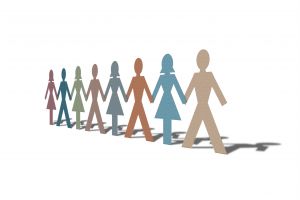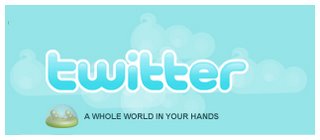 Twitter is a social network, meaning, an application available on the internet where users interact in a precise manner. In the case of Twitter, the objective of its members is to communicate to others what is being done at a given moment by answering the question of what are you doing?.
Twitter is a social network, meaning, an application available on the internet where users interact in a precise manner. In the case of Twitter, the objective of its members is to communicate to others what is being done at a given moment by answering the question of what are you doing?. Once one is a member of the network they can begin writing a message, comprised of a maximum of 145 characters. And unless it is otherwise specified, all users will be able to read it.
Twittwer was the network sensation of 2007, and you can answer back not only by writing in the very same application, but also by means of a text message from your mobile phone (with two numbers for international use, one for the USA and another for England) or by using an instant messenger client like Google’s GTalk. Also, each user can receive messages from other members via the Web, instant messenger or SMS.
Registering yourself with Twitter is very easy. All that is needed is a valid e-mail account. You then begin adding users one at a time to your friends list and become their follower. Every time you open your page you know what they are doing and you can read what it is you have been writing as well.
The explanation of Twitter’s success lies for many in the system’s and the idea’s simplicity. Who doesn't want to know what their friends, and even strangers, are doing? Besides, it is also very easy to stay connected to the network without having to be right in front of your computer.
Twitter was invented by Evan Williams, one of the people that revolutionized online publication systems with blogs, by means of Blogger. Therefore, one can imagine that Twitter is on that same path: revolutionizing the Internet’s social networks.

Twitter is useful to the Third Sector
This social network has allowed some groups and even some web pages that belong to government agencies and NPO's to be born. It can also set a good example for the third sector by using Twitter to defend certain causes.
* Those that are looking to provide information such as eDiets, which deals with women’s health and health in general
* Those that try to provide motivational support e.g.: Qwitter (to quit smoking), Twitter PT Challenge (fitness)
* Those that want to create a network for social support like Real mental health, o Traineo (a weight loss sport)
* Some dedicate their time to fundraising – like 1PinkRibbon, Frozen Pea Fund, Beth Kanter/Sharing Foundation
* There are some groups that respond to disasters: safeandwell (from the American Red Cross), InSTEDD (a union of google.org and the Rockefeller foundation)
* Those that wish to organize activities or lectures- Tweet What You Eat (food journals), SugarStats (diabetes), gtFtr (exercise), pain diary, My Mile Marker (fuel economy)
* Reminders such as Timer ( which can be used for remedies, relaxation breaks, etc.)
* To spread information and get it out in the open quickly like the Los Angeles Fire Department in order to look for missing people for example
* Others connect patients and health service provides such as Medical Solutions.
* Some are used to conduct research on topics such as ethnography
* Some talk about how to change your figure like skinnyjeans (to lose weight)
* And those that diffuse early warning systems like Morbus (for pandemics), and alert you of problems











